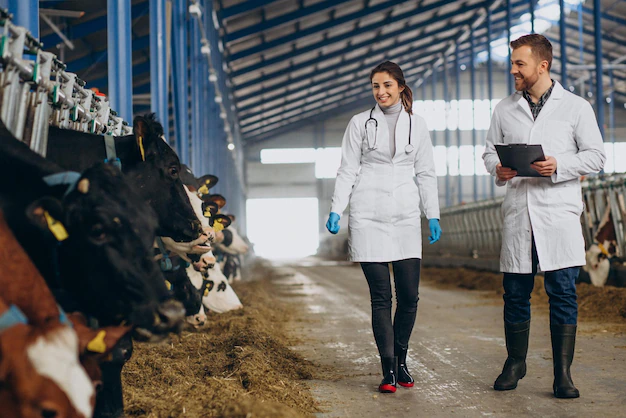- Role and Responsibilities: A livestock nutritionist is a professional who specializes in designing and formulating diets for various types of livestock, such as cattle, pigs, poultry, and sheep. They analyze the nutritional needs of animals and develop feeding programs to optimize their growth, reproduction, and overall health.
- Education and Qualifications: To become a livestock nutritionist, a minimum of a bachelor’s degree in animal science, animal nutrition, or a related field is typically required. Some positions may prefer or require a master’s or doctoral degree. Additional certifications and professional memberships in organizations such as the American Registry of Professional Animal Scientists (ARPAS) can also enhance career prospects.
- Expertise in Animal Nutrition: Livestock nutritionists possess a deep understanding of animal physiology, digestive systems, and nutrient requirements. They stay updated with the latest research and advancements in the field to ensure their recommendations align with the nutritional needs of different livestock species.
- Feed Formulation: A significant aspect of a livestock nutritionist’s job is formulating balanced diets for different stages of an animal’s life, taking into account factors like age, weight, breed, reproductive status, and production goals. They carefully select and combine feed ingredients, such as grains, forages, protein sources, vitamins, and minerals, to meet the animals’ nutritional requirements.
- Nutrient Analysis and Evaluation: Livestock nutritionists conduct nutrient analysis on feed ingredients to determine their composition and quality. They also evaluate the nutritional value of different feeds and supplements using laboratory testing methods and software programs. This information helps them make informed decisions when formulating diets.
- Problem Solving and Troubleshooting: Livestock nutritionists are adept at identifying and addressing nutritional issues that may arise in animal herds. They analyze feed-related problems, such as poor growth, weight loss, reproductive difficulties, or metabolic disorders, and recommend appropriate dietary modifications or interventions to rectify the issues.
- Client Consultation and Communication: Livestock nutritionists often work directly with farmers, ranchers, and agricultural businesses. They provide expert advice and guidance on animal nutrition, feeding strategies, and management practices. Effective communication and the ability to explain complex concepts in a clear and concise manner are essential skills in this role.
- Research and Data Analysis: Livestock nutritionists may participate in research projects to explore new feed ingredients, evaluate the efficacy of nutritional supplements, or improve feeding techniques. They collect and analyze data, interpret research findings, and contribute to scientific publications or industry conferences to share knowledge within the field.
- Industry Regulations and Compliance: Livestock nutritionists must stay informed about local, national, and international regulations regarding animal feed, additives, and medication. They ensure their recommendations align with these regulations and maintain compliance with industry standards and best practices.
- Continuous Learning: The field of livestock nutrition is constantly evolving, with new research findings and technological advancements shaping the industry. Livestock nutritionists are committed to lifelong learning, attending seminars, workshops, and continuing education courses to stay updated and enhance their skills and knowledge.
Join 'Farmers Mag' WhatsApp Channel
Get the latest Farming news and tips delivered straight to your WhatsApp
CLICK HERE TO JOIN






